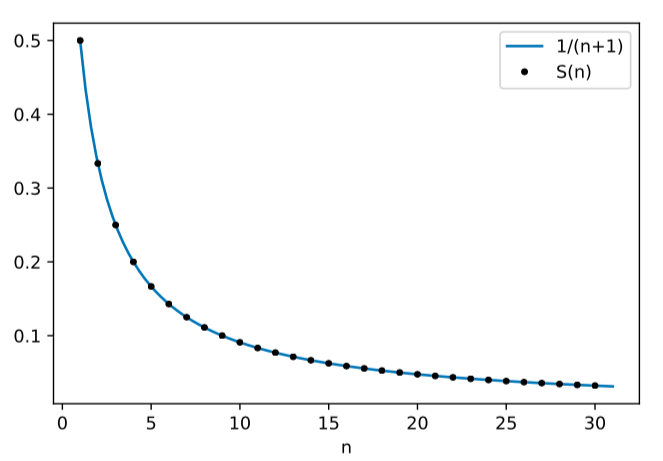Consider the following sum over partitions of $n$:
$$ S(n)=\sum_{\substack {j_1,\dots,j_n\geq 0\\j_1+2j_2+\dots+nj_n=n}} \prod_{t=1}^n \frac{1}{j_t!t^{j_t}}f_t(j_1,\dots,j_t),$$
where
$$ f_t(j_1,\dots,j_t)=\begin{cases}\frac{j_t}{j_t+1}\,&\textrm{if } j_1+2j_2+\dots+(t-1)j_{t-1}=t-1 \\1 \,&\textrm{otherwise}\end{cases}.$$
I have strong numerical evidence that
$$ S(n)=\frac{1}{n+1},$$
but I cannot prove it, I was wondering if anyone could give me ideas.
Some observations: I wasn't able to compute it using a simple generating function, since I would need $f_t(j_1,\dots,j_t)$ to be a function only of $j_t$.
The function $$f(j_1,\dots, j_n)=\prod_{t=1}^n f_t(j_1,\dots,j_t)$$ can also be intepreted as a function of the cycle structure of a permutation depending on which "subpartitions" $j_1,\dots, j_n$ contains, or on the invariant subsets of $\{1,\dots, n\}$ under the permutations with the cycle structure given by the partition. $S(n)$ can be seen as the average of $f$ over the permutation group, since the $\prod_{t=1}^n \frac{1}{j_t!t^{j_t}}$ is the probability of drawing a permutation with $j_k$ $k-$cycles in its decomposition.
Ideally, I would like to compute, or at least bound
$$ S(n,x)=\sum_{\substack {j_1,\dots,j_n\geq 0\\j_1+2j_2+\dots+nj_n=n}} \prod_{t=1}^n \frac{x^{j_t}}{j_t!t^{j_t}}f_t(j_1,\dots,j_t),$$
for $x>0$, but I don't have a good conjecture on the form of this sum, except for $x=1$.

